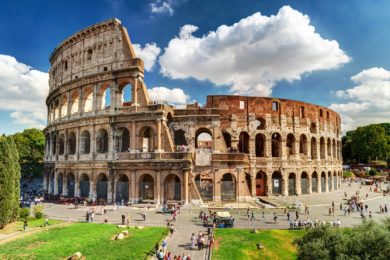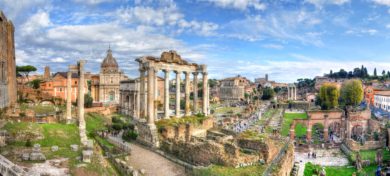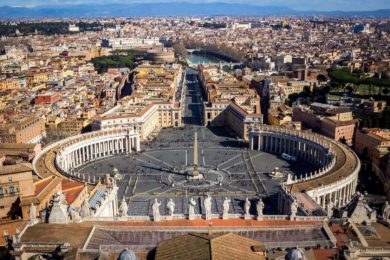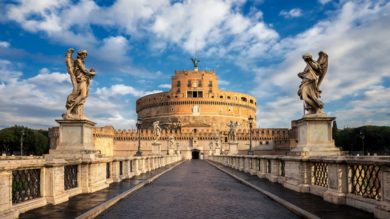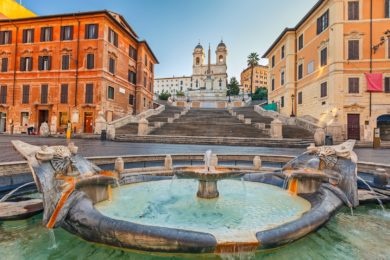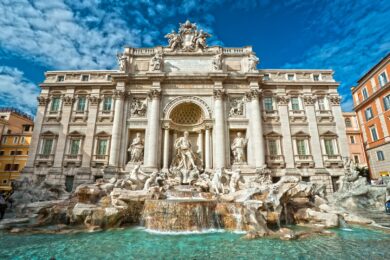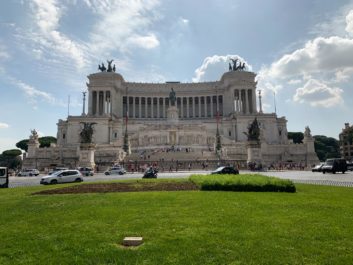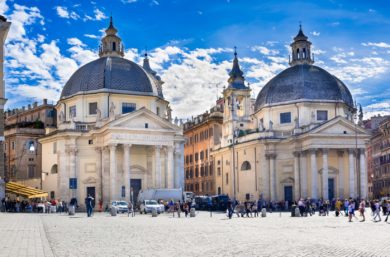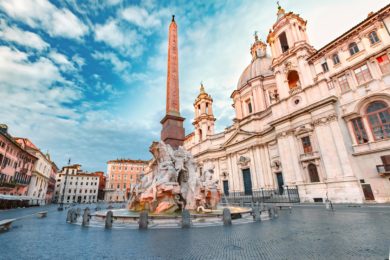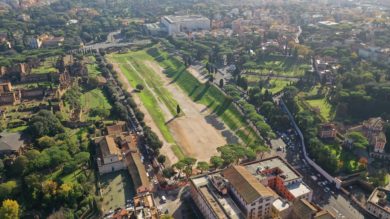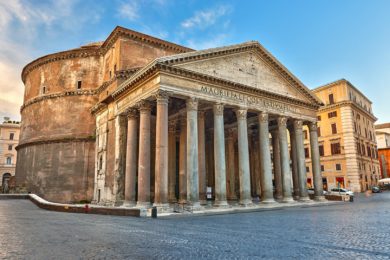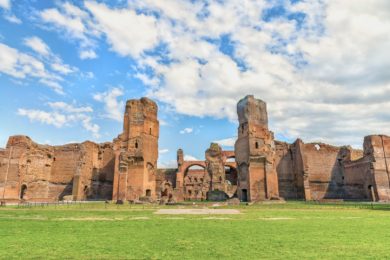Rome
With a history dating back 28 centuries, Rome is one of the oldest cities in the world. Legend has it that two twins Romulus and Remus were abandoned by the King Amulius of Alba Longa, an ancient Latin city in central Italy. These twins were cared for in the wild by a she-wolf. In 753 BC, the twins decided to build a city, but after an argument, Romulus killed Remus, and therefore the city took his name.
After the city’s founding in 753 BC, Rome became the capital of the Roman Kingdom. Little of known of this period, other than that there were seven kings of Latin, Etruscan and Sabine origin: Romulus, Numa Pompilius, Tullus Hostilius, Ancus Marcius, Servius Tullius, and Lucius Tarquinius Superbus. It is during this period that the first major settlements around Palatine Hill and the Tiber river emerged.
In 509 BC, the last king was expelled from the city, and the Roman Republic was established. During this period, a series of oligarchs led numerous wars and expanded Rome’s hegemony over the Italian peninsula, the Mediterranean and the Balkans. Around 60 BC, the First Triumvirate was established. It started as an informal alliance between three prominent Roman politicians: Gaius Julius Caesar, Gnaeus Pompeus Magnus, and Marcus Licinius Crassus. However, from 58-50 BC, Julius Caesar gained tremendous power and popularity as he led the Roman armies to victory in the Gallic wars, invaded Britain, and built a bridge across the river Rhine. At the end of these wars, the Roman Senate ordered Caesar to step down as general and return to Rome. Caesar defied this order, and crossed the Rubicon, the river that marked the boundary between Gaul and Italy, starting Caesar’s civil war, which resulted in him crowning himself dictator perpetuo (perpetual dictator) of Rome in 44 BC.
During his dictatorship, Caesar pursued several social and governmental reforms. He established the Julian calendar, gave Roman citizenship to several residents of far regions of the Roman Republic, initiated land reforms, and centralized the bureaucracy of the Republic. Angered by his populist reforms and his growing power, on 15th March 44 BC, a date known as the Ides of March, a group of rebellious senators led by Brutus and Cassius assassinated Caesar by stabbing him to death. The site of his cremation is still visible today in the Roman Forum. After Caesar’s assassination, Caesar’s great-nephew and adopted heir, Octavian, founded the Second Triumvirate along with Mark Antony and Marcus Aemilius Lepidus. However, the triumvirate did not last long, with civil war breaking out between Octavian and Mark Antony. In 27 BC, Octavian took the name Augustus and became princeps civitatis of new Roman principate.
Augustus dramatically expanded the Roman Empire annexing Egypt, Dalmatia, and expanding its territory in Africa, He also reformed the Roman system of taxation, developed a network of roads, established a standing army and official police and fire-fighting services for Rome, and rebuilt much of the city during his reign. After his death in 14 AD he was succeeded by Tiberius, who reigned till 37 AD. He was succeeded by Caligula who was assassinated in 41 AD. From 41 AD to 54 AD, the Roman Empire was ruled by Claudius, Caligula’s uncle. Under Claudius, the Empire underwent its first major expansion since the reign of Augustus. The provinces of Thrace (modern day Bulgaria, Greece and Turkey), Lycia (modern day southern Turkey), and Judea (southern part of modern day Israel and part of the West Bank) were annexed during his term. He also launched Rome’s conquest of Britain, which went on for 40 years. Claudius was succeeded by Nero, who is most famous for having played the fiddle while more than two-thirds of Rome burned down during the Great Fire of Rome in 64 AD. The Roman empire however, continued to expand, reaching its peak during the reign of Trajan from 98 to 117 AD.
From here on, the Roman Empire steadily declined, but Rome eventually gained new glory as the fountainhead of Christianity and a major center for the arts. During the Renaissance period from the mid-15th to 16th centuries, Rome attracted artists like Michelangelo and Raphael, sculptors like Donatello and architects like Filippo Brunelleschi.
In its modern history, Rome was one of the last cities to join a unified Italy in 1870. Rome was made the capital of Italy, however, the Catholic Church refused to accept Italian authority, until a compromise was reached in 1929 by fascist dictator Benito Mussolini, with the Vatican being recognized as a sovereign city-state. Rome fell to the Germans during World War II, but since then, it has emerged as one of the most important European capitals and most charismatic cities in the world.
With a dizzying array of historical monuments from the Colosseum, to the Roman Forum, Spanish Steps, Trevi Fountain, Piazza Venezia, Castel Sant’Angelo, and the Vatican, along with several vibrant cafes and restaurants, and spellbinding museums with world-renowned art and sculptures, Rome is a must-see destination on everybody’s bucket list.
Destinations
Key sights to see
Map
Add to current board
- My Board
- Ali Thursday Test
- Our 2nd Board Test
- third board
- Africa
- My Board
- Paris
- My Board
- My Board
- My Board
- My Board
- My Board
- My Board
- fhjm
- gfdg
- Europe
- Atacama
- London
- Cape Town
- Europe Trip
- Chile Trip
- Easter Island
- Zimbabwe
- My Trip
- Ghana
- My Board
- Test
- Test test1
- Argentina
- Ecuador and the Galapagos
- Italy
- My Board
- my trip
- My Board
- My Board
- My Board
- My Board
- My Board
- My Board
- Botswana
- My Board
- Beaches
- My Board
- Patagonia
- My Board
- My first board
- My Board
- My Board
- Greece
- My Board
- My Board
- Iberian Peninsula
- My Board
- Athens
- My Board
- My Board
- My Board
- My Board
- Ecuador
- My Board
- Argentina
- Argentina Dec21
- Argentina Dec21
- My Board
- My Board
- Turkey
- My Board
- Greece
- My Board
- My Board
- My Board
- Dominican Republic
- My Board
- Patagonia – 2023
- My Board
- My Board
- My Board
- My Board
- My Board
- My Board
- My Board
- My Board
- My Board
- My Board
- My Board
- My Board
- My Board
- My Board
- My Board
- My Board
- My Board
- My Board
- My Board
- My Board
- My Board
- My Board
- My Board
- My Board
- My Board
Add to favorite
Your new board is ready, add more of your favorite places, activities, countries and accommodations
